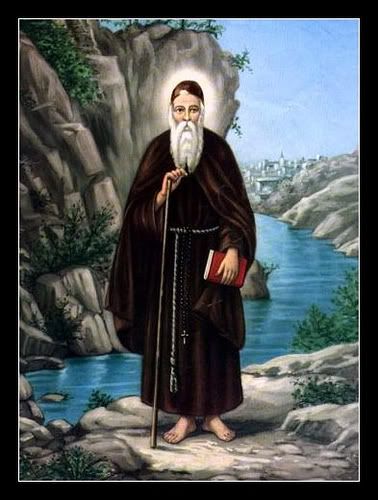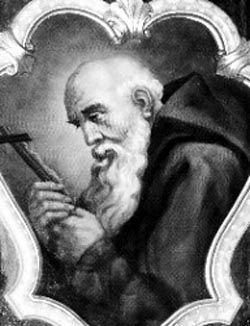Why pray the Rosary every day for a year?
Each time the Blessed Virgin has appeared-- whether it be to Saint Bernadette Soubirous at Lourdes; to Lucia, Jacinta, and Francisco at Fatima; or to Mariette Beco at Banneux-- she has asserted the importance, saving grace, and power of praying the Holy Rosary on a daily basis. Based upon her words, the Rosary is penance and conversion for sinners, a pathway to peace, an end to war, and a powerful act of faith in Jesus Christ. Pope Paul VI presented the Rosary as a powerful means to reach Christ "not merely with Mary but indeed, insofar as this is possible to us, in the same way as Mary, who is certainly the one who thought about Him more than anyone else has ever done."
To show us how this is done, perhaps no one has been more eloquent than the great Cardinal Newman, who wrote: "The great power of the Rosary consists in the fact that it translates the Creed into Prayer. Of course, the Creed is already in a certain sense a prayer and a great act of homage towards God, but the Rosary brings us to meditate again on the great truth of His life and death, and brings this truth close to our hearts. Even Christians, although they know God, usually fear rather than love Him. The strength of the Rosary lies in the particular manner in which it considers these mysteries, since all our thinking about Christ is intertwined with the thought of His Mother, in the relations between Mother and Son; the Holy Family is presented to us, the home in which God lived His infinite love."
As Mary said at Fatima, "Jesus wants to use you to make Me known and loved. He wishes to establish the devotion to My Immaculate Heart throughout the world. I promise salvation to whoever embraces it; these souls will be dear to God, like flowers put by Me to adorn his throne."

Today, February 19 marks the feast day of Saint Conrad of Piacenza (1290-1350), a saint who is remembered for great piety, humility, charity, and honesty. Born to one of the most noble and wealthy families in the town of Piacenza in Northen Italy, Conrad grew up in a lifestyle marked by privilige and leisure. Among his family and peers, however, he was also noted for deep faith in the Lord, and led a virtuous and God-fearing life. Having married quite young, both he and his wife were recognized for their piety and charity.
As was common in noble families at that time, Saint Conrad spent much of his time hunting. During one such outing, he ordered his attendants to scatter some brush and light it on fire in attempts to smoke out some game hiding there. Without warning, a great wind arose, and mercilessly spread the fire beyond that planned, causing severe damage to nieghbors homes and land. Authorities mistakingly arrested a mendicant friar living in the area, and the man was tried and sentenced to death.
Both Conrad and his wife, seeing the injustice and unable to stand their role in it, agreed to confess. As the friar was being led to execution, Saint Conrad made a public confession of the crime. He sold all his possessions, giving them away to those who had lost property. Now desitute, he and his wife separated, Saint Conrad entering a monastery of the Franciscan Order, and his wife entering the Orde of Poor Clares.
Saint Conrad spent the remainder of his life in Rome, and then in Sicily, living a life of repentance, penance, and austerity. As news of his piety and holiness spread, he receieved many visitors which forced him to relocate numerous times, preferring the solitude of penitence. He fled to the valley of Noto, Italy, where he lived as a hermit for 36 years. During his hermitude, he lived a life of extreme austerity, sleeping on the bare ground with a stone for pillow, and with dry bread and raw herbs for food.
Numerous miracles have been attributed to him while he lived, and subsequently at his tomb in Noto, Italy. Holy legend records, for example, that when the Bishop of Syracuse visited him, the he asked Saint Conrad if he had anything to offer guests. Conrad said he would check in his cell and returned moments later carrying newly baked cakes, which the bishop accepted as a miracle. Saint Conrad was also reported to have traveled surrounded by a cloud of fluttering birds, keeping him company.
Conrad died while praying before a crucifix in 1350, surrounded by a bright light, in the presence of his confessor, who was unaware for some time of his death because of his position. While he is recognized and referred to as saint, Conrad has never been officially canonized. Through Papal authority, he is recognized throughout the Franciscan Order on February 19, but has also an established devotion throughout the world.
Saint Conrad reminds us that holiness lies within each of us, regardless of the acts or sins we have committed. In turning to the Lord, and renouncing his ties to the world, Conrad entered a deeply mystical and prophetic connection with God, atoning for his sins and receiving the grace of forgiveness. During Lent, Conrad may be looked to as a reminder of all we have done, and how the Lord graces us with forgiveness and love, if only we ask for forgiveness.
Day 50 of 365
Prayer Intentions: Forgiveness for our sins.
Requested Intentions: For the success of surgery for a friend (E); For the restoration of hearing (L); For a restorative, faith-deepening Lent for all those who are struggling (L); For a niece suffering with autism, and for all those affected by autism (V); For a daughter’s employment (J); For a son’s employment and growth in faith (M); Those planning for surgery (L).
Special Intentions (Day 9 of 45-day Novena to Our Blessed Lady of Lourdes): The intentions of all those who read this blog, whether submitted or retained in the quiet of their hearts; Penance, Penance, Penance for sinners; For all those who are suffering.
Subscribe to:
Post Comments (Atom)








0 comments:
Post a Comment
Thanks for leaving a comment. If you wish to submit a prayer request, however, please do so above, using the "Contact" tab.